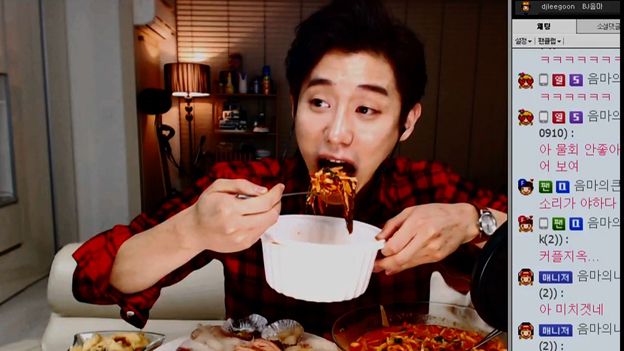The Koreans who televise themselves eating dinner
- Published

How do you fancy eating your dinner at home in front of a webcam and letting thousands of people watch? If they like the way you eat, they will pay you money - maybe a few hundred dollars a night... a good salary for doing what you would do anyway. This is happening now in South Korea.
It's often said that if you want to see the future look at how technology is emerging in perhaps the most connected country on the planet. The food phenomenon is called mukbang - a combination of the Korean word for eating (muk-ja) and broadcasting (bang-song).
I have seen this future in the eighth-floor apartment of Lee Chang-hyun in Seoul (pictured at work, above). At around midnight, he goes online with a couple of friends and performs his meal, spicy raw squid one day, crab the next. "Perform" is the right word. He is extravagant in his gestures, flaunting the food to his computer camera to tantalise the viewers. He eats noisily and that's part of the show. He's invested in a good microphone to capture the full crunch and slurp.
This is not a private affair. Some 10,000 people watch him eating per day, he says. They send a constant stream of messages to his computer and he responds verbally (by talking) and orally (by eating, very visibly and noisily).
If the audience like the performance, they allocate him what are called "star balloons" and each of these means a payment to him and to the internet television channel on which he performs. He is coy about how much he earns but the BBC has estimated, by noting the number of star balloons on his screen, that it would run into several hundred dollars for a two-hour stint.
His performance-eating is part of a phenomenon which says something about the way society is changing and about the way television is changing - in Korea today, and perhaps, in your own country, tomorrow.
BJ Termin eats rice, cheese omelette, pork stew and kimchi on Afreeca TV
Lee Chang-hyun's show, because that's what it is, is on an internet channel called Afreeca (short for "Any FREE broadCasting"). This site lets people stream their own live video to others - many others. In effect, it's a TV channel without all the paraphernalia and cost of a TV channel. Those who perform, like Lee Chang-hyun or BJ Termin (in the video above) are known as broadcast jockeys.
What's the appeal of watching other people eat, and what's the appeal of watching them remotely from your own computer screen? Is it a kind of voyeurism, food porn, perhaps?
Lee Chang-hyun calls himself an avatar. Viewers see themselves in him, so he thinks he eats to give them vicarious pleasure: "In Korea, for women especially, the figure is quite important. There are dishes which are quite fattening, so me eating those foods for them provides them with a bit of satisfaction," he says.
But to me this doesn't seem very convincing. The point of eating is eating and "I eat so you don't have to" doesn't seem to add up.
The appeal, rather, may be in companionship - albeit remote companionship over the internet. It feels like a dinner party where the diners are talking from different rooms. "They like to see me eat but we also have lots of conversations," says Lee Chang-hyun. "We talk about everything. I even give them counselling about problems they might have so we have a real relationship."
It may or may not be a real relationship of our times - a relationship between remote people, far apart, each in their own apartments, atomised in the mega-city.
Lee Chang-hyun earns money because he performs well. He presents a constant stream of observation and light-hearted remarks. He might get up and dance to a song that's playing in his headphones. He sings for his supper. He's not just a slob who slumps in front of his meal and shovels the food in on a webcam - though these also exist as part of the phenomenon). He is good-looking and slim, despite all the big meals. He says he does extreme sports and has the right metabolism for shovelling food in without putting pounds on.
So the money clicks in. He sees the symbols signifying a donation on his screen - but he says it's not the money that motivates him. "I'm actually hanging out with my viewers. In a way, it's a promise, a pact that I have with them. I hang out with them. I'm having fun with them, so in that sense I don't consider it a job."
Korean recipes from BBC Food
But it's the most brutal form of television performance. Where stars in conventional television negotiate contracts and get paid with certainty for the duration of the contract, his pay goes up and down by the second depending on how the viewers react that moment. They have the "pay" button in their hands. If he is on a bad day, they don't click. If he's on a roll, they do. It's not a remuneration system likely to appeal to the big-name presenters in the conventional television industry.
And the idea of remote companionship down a webcam might depress those who believe in human warmth by direct contact.
But both may be the future. South Korea is very tech'd-up. Everyone seems to be online all the time. In that sense, it is the future. If Koreans are having cyber dinner at midnight today, sure as raw squid is raw squid, you will be tomorrow.
Subscribe to the BBC News Magazine's email newsletter to get articles sent to your inbox.